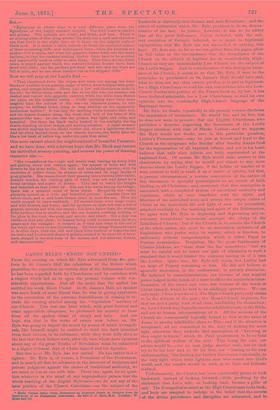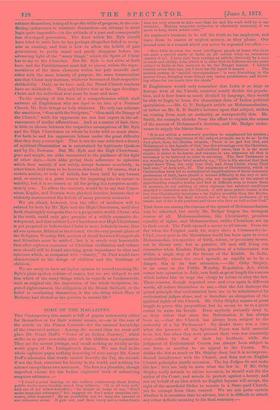CANON RYLE'S ' KNOTS ' NOT UNTIED.*
FROM the evening on which Mr. Ryle advocated from the plat- form in St. James's Hall the relaxation of the Rubric which prescribes the repetition on certain days of the Athanasitur Creed, he has been regarded both by Churchmen and by outsiders with a respect which led us to open the present volume with con- siderable expectations. And all the more, that the author has entitled his work, Knots Untied. In St. James's Hall, no speaker was more frank or more liberal than he was in giving expression to the conviction of the extreme desirableness of ceasing to in- clude the cursing symbol among the " regulation " services of our Church. This was one knot which, with great fervour and some appreciable eloquence, he professed his anxiety to loose from off the spoken ritual of clergy and laity. And our hope was that in the series of essays now before us, Mr. Ryle was going to impart the secret by means of which Evangeli- cals, like himself, might be enabled to hold the faith inherited from their fathers, in its substance, while they were fully alive to the fact that these fathers were, after all, men whose mere opinions about any of the great Truths of Revelation must be submitted to a higher tribunal, that of Christ himself and his Apostles.
But this knot Mr. Ryle has not untied. He has rather tied it tighter. Mr. Ryle is, of course, a Protestant of the Protestants, and in nearly all that he advances in the interests of Scripture and private judgment against the claims of traditional authority, we are more or leas at one with him. There can, again, be no ques- tion whatever in the mind of any unprejudiced person that the whole teaching of the English Reformers—we do not say of the later portion of the Church Catechism—on the subject of the * Knots Untied, being Plain Statements on Disputed Points in Religion from She Btand-point of an Erangeitcal Churchman. By Bova. 0. Ryle, M.A. Loudon ; W. Bunt and Co. Eucharist is distinctly anti-Roman and anti-Ritualistic ; and the catena of authorities which Mr. Kyle produces is, to us, demon- strative of the fact. In justice, however, it has to be added that all the great Reformers, Calvin included, with the soli- tary exception of Zwingle, believed, so to speak, in baptismal regeneration, and Mr. Ryle has not succeeded in untying this knot. He does not, so far as we can gather from his pages, allow its full value to the circumstance that the formularies of the Church on the subject of baptism are as unmistakably High- Church as they are unmistakably Low Church on the subject of the Lord's Supper. And in consideration of this divergent utter- ance of the Church, it seems to us that Mr. Ryle, if true to the principles he proclaimed in St. James's Hall, should have said, what he does not say, that cmteris paribus, it is just as legitimate for a High Churchman to read his own convictions into the Low- Church Eucharistic portion of the Prayer-book as, by law, it has been declared admissible for a Low Churchman to read his own opinions into the confessedly High-Church language of the Baptismal Service.
Mr. Ryle, no doubt, repeatedly in the present volume disclaims the imputation of intolerance. He would live and let live, but he does not seem to perceive that the English Churchman who publishes a doctrine respecting the Sacrament of the Lord's Supper identical with that of Martin Luther—and we suppose Mr. Ryle would not doubt, save in this particular question,. Luther's Protestantism—may be just as honest and loyal to the Church as the clergyman who Sunday after Sunday thanks God for the regeneration of all baptised infants, and yet in his heart believes that only elect infanta are truly regenerated at the baptismal font. Of course, Mr. Ryle would make answer to this observation by saying that he would not object to any mere doctrine about the Lord's Supper, if the holder or teacher of it were content to hold or teach it as a matter of opinion, but that, in present circumstances, a certain conception of the nature of this Sacrament is specially promulgated as an article of faith binding on all Christians ; and, moreover, that this conception is. associated with a completed system of sacerdotal authority and regulation, which at once interferes with the rights and liberties of the individual soul, and usurps the unique claims of Christ as the immediate life and light of men. As journalists, attached cordially to the teaching and spirit of the Reformation, we agree with Mr. Ryle in deploring and deprecating any re- actionary hierarchical movement, amongst the clergy .of the Established Church ; but if the Church is to remain the Church of the whole nation, she must be an association inclusive of all Englishmen who prefer unity to variety, which is freedom, to uniformity without comprehension, which is either Papal or Puritan sectarianism. Doubtless, like the great functionary of Charles Dickens, we "must draw the line somewhere," but we must be careful not to lower our gate of admission to such a standard that it would hinder the entrance among us of a man like Luther. Quite true, Mr. Ryle will rejoin, but Luther had no taint of Popery remaining in him. He did not believe in apostolic succession, in the confessional, in priestly absolution_ He believed in consubstantiation, not because of any magical power lodged in the hands of a caste to effect the mysterious trans- formation of the bread and wine, but because of the words of Christ himself, which he held to be abidingly operative. We can only reply, Christ is not divided. The High-Church party only claims to be the witness of the past ; the Broad-Church inquirers, for they are not a party, least of all claim infallibility for themselves ; the Low Church may logically ascribe infallibility only to the Bible, and not to human interpretations of it. All the sections of the Church are consequently logically bound to bow at the name of Jesus, to ascribe infallibility alone to Him; and if the situation is recognised, all are committed to the duty of seeking for more light, otherwise they underlie that assumption of "knowing as they ought to know," which St. Paul pronounces to be so fatal to the spiritual welfare of the soul. This being the case, our advice would be,—let no man judge another man, but let each try to be his best and to do his best, not "leaning to his own understanding," but looking for further discoveries continually, to the only light which truly lightens man who comes into God's world, and the results would be such as we have not hitherto realised.
Unfortunately, the Church has been continually prone to look backward, instead of looking forward,—little profiting by the statement that Lot's wife, on looking back, became a pillar of salt. The Evangelical as much as the High Churchman looks back, and both are tempted to indulge in the belief that the secrets of the divine providence and discipline are exhausted, and to
exhaust themselves, losing all hope the while of progress, in the con- flicting endeavours to reinstate themselves—an attempt in strict logic quite impossible—in the attitude of a past and consequently less developed generation. The knot which Mr. Ryle should have tried to untie here he has perhaps altogether failed to recog- nise as existing, and that is how to allow the beliefs of past generations to partly stand and partly disappear before the advancing light of the "many things" which the Spirit of Christ has to say to the Churches. But Mr. Ryle is not alone at fault here, and the Establishment must fall to pieces, unless the repre- sentatives of the three elements within her pale accredit each other with the same honesty of purpose, the same transcendent aim that Christ may increase, whatever becomes of their respective shibboleths. Only, as we have said, the Broad-Church teachers have no shibboleth. They only believe that as the ages develope, Christ and the individual soul must be more and more.
To the untying of this knot of a comprehension which shall embrace all Englishmen who are loyal to the idea of a National Church, Mr. Ryle brings no help whatever. He only can reiterate the assertions, "thus saith the Scripture," "thus saith the liturgy of the Church," while his opponents are not less expert in the ad- vancement of similar affirmations. And as a matter of fact, there is little to choose between the respective assumptions of Mr. Ryle and the High Churchmen on whom he looks with so much alarm. For both he and his opponents labour under the great difficulty that they deny present light. That is not the case with such a theory of spiritual illumination as is entertained by legitimate Quakers and by Dr. Newman. But Mr. Ryle and the High Churchman, pure and simple, are alike committed to the guidance of the light of other days,—both alike giving their adherence to opinions which they mainly, if not solely, accept because somebody, in other times, held them to be heaven-descended. Of course, that a certain notion, or code of beliefs, has been held by any human soul, or society, is a great reason for inquiring into its nature or validity, but it is no reason at all for giving it a reception as ulti- mately true. To affirm the contrary, would be to say that Coper- nicus, Kepler, and Newton were physical heretics, because they so 'violently controverted the beliefs of many previous centuries.
We are afraid, however, that the office of mediator will be refused by both by Mr. Ryle and the High Churchman, until they both thoroughly recognise that in a progressive world, Christ, who is the truth, could only give promise of a widely expansive de- velopment, and that neither Low Churchman nor High Churchman is yet prepared to believe that Christ is more, infinitely more, than all our systems, Biblical or traditional. On the very prosaic plane of the Religious Worship Bill, matters of detail between Evangelicals and Ritualists must be settled ; but it is surely very lamentable that after eighteen centuries of Christian civilisation and culture men should still be found attaching great importance to rites and opinions which, as compared with "charity," St. Paul would have characterised as the doings of children and the thinkings of children.
We are sorry to have no higher opinion to record touching Mr. Ryle's plain-spoken volume of essays, but we are obliged to ask him which of the many things which he regards as fundamentals, such as original sin, the inspiration of the whole Scriptures, im- puted righteousness, the obligation of the Mosaic Sabbath, or the belief in everlasting damnation, is the one thing which Mary of Bethany had elected as her portion in eternal life?



































 Previous page
Previous page